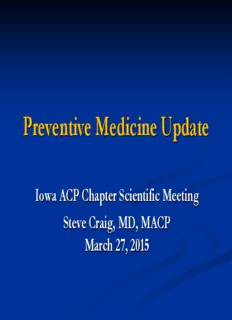
Preventive Medicine Update - Internal Medicine | ACP PDF
Preview Preventive Medicine Update - Internal Medicine | ACP
Preventive Medicine Update Iowa ACP Chapter Scientific Meeting Steve Craig, MD, MACP March 27, 2015 Preventive Medicine Update Outline So You Think You Know Preventive Medicine & Screening? What is Preventive Medicine? Levels of Prevention: Primary, Secondary, Tertiary Primary Prevention Recommendations Secondary Prevention Recommendations & The USPSTF Recently Updated + Controversial Screening Recommendations Resources for Primary & Secondary Prevention Recommendations Answers to Preventive Medicine & Screening Questions Sample Preventive Medicine Cases What is Preventive Medicine? Preventive Medicine involves administering tests or treatments to prevent illnesses before they cause symptoms or problems ( includes screening tests, counseling services, and preventive medicines) In prevention, the goal is to preserve and promote health and well being Prevention in public health moves interventions from the individual level to a population level Effective prevention leads to a healthier community Levels of Prevention Primary Prevention: Avoidance of disease or injury Secondary Prevention: Early detection and treatment Tertiary Prevention: Manage existing conditions – reduce disability & promote rehabilitation Examples: * Cardiac / Stroke rehabilitation * Mental Health interventions * ESRD measures Primary Prevention Immunizations Sanitation: clean water, food inspection Workplace Safety: seatbelts, helmets, hand washing Education: preventing tobacco & drug abuse, promoting exercise Diet: preventing obesity, healthy choices Leading Causes of Death Heart disease: 616,067 1. Cancer: 562,875 2. Stroke (cerebrovascular diseases): 135, 952 3. Chronic lower respiratory diseases: 127, 924 4. Accidents (unintentional injuries): 123,706 5. Alzheimer’s disease: 74,632 6. Diabetes: 71,382 7. Influenza and Pneumonia: 52,717 8. Nephritis, nephrotic syndrome, nephrosis: 46,448 9. Septicemia: 34, 828 10. *Data from 2007 National Vital Statistics Report- US Adults Actual Causes of Death Tobacco: 435,000 1. Poor diet and physical inactivity: 400,000 2. Alcohol consumption: 85,000 3. Microbial agents: 75,000 4. Toxic agents: 55,000 5. Motor vehicle: 43,000 6. Firearms: 29,000 7. Sexual behavior: 20,000 8. Illicit Drug use: 17,000 9. *Mokdad, Actual Causes of Death in the US, 2000. JAMA 2004. Behavioral Determinants Virtually ALL of the top 10 leading causes of death in US adults are moderately to STRONGLY influenced by lifestyle patterns and behavioral factors BEHAVIOR DISEASE Tobacco Use Heart Disease Physical Activity Stroke Diet Cancers Preventive Services Diabetes Leading Health Indicators Healthy People 2020 Physical activity Overweight and obesity Tobacco use Substance abuse Responsible sexual behavior Mental health Injury and Violence Environmental quality Immunization Access to health care Physician Barriers to Counseling on Primary Prevention Measures Lack of time Reimbursement issues Insufficient confidence Insufficient knowledge Insufficient skills Others? Current Evidence Patient’s note counseling has significant effect on understanding and motivation BUT physicians often provide insufficient guidance
Description: